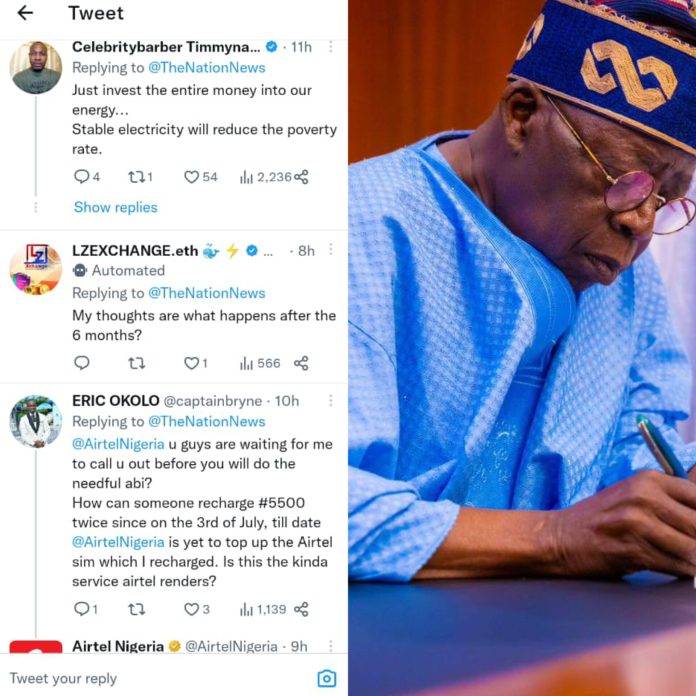Miracle Akubuo
President Bola Ahmed Tinubu, in a letter to the House of Representatives, has said that 12 million families will get 8,000 naira over a period of six months to ameliorate the hardship faced by Nigerians as a result of subsidy removal and also to support and enable poor and vulnerable Nigerians to cope with the cost of meeting basic needs.
He noted that the development will have a multiplier effect on about 60 million individuals and emphasized the use of digital transfer for direct beneficiary account payments.
This initiative has generated various opinions and concerns among Twitter users, highlighting the complexities and challenges associated with implementing such decision.
While some users raised valid concerns about the effectiveness, distribution, and selection criteria of the program, others emphasize the importance of addressing broader challenges such as transportation and energy infrastructure.
There are also those who appreciate the gesture as a step toward alleviating poverty, albeit with expectations for more comprehensive solutions.
Ken Ehi questioned the effectiveness of the order, raising valid concerns about the broader issues of rising transportation and food costs, as well as the identification and distribution of funds.
Ehi asked, “Does that change the rise cost of transportation and food? How many people have an active bank account? How do they intend to distribute these funds, and how can the federal government identify poor citizens?”
He dismissed the development as irrelevant, instead suggesting that the government focus on improving transportation infrastructure to benefit all citizens. Gold expressed, “Transferring 8,000 to registered APC members monthly is arrant nonsense. What affects everyone is transportation, reinvesting the federal mass transit and making transportation cheap both locally and internationally. Many have left their jobs because of high transportation.”
Eyan Baddo proposed an alternative approach, advocating for the funds to be allocated towards reducing fuel prices, which would have a cascading effect on the overall cost of living. Baddo argued, “He should spend it on fuel. Once fuel reduces, everything will be less as well. Let’s assume fuel reduces to 200 per liter, keep your 300 from the 500 we are currently buying.”
Galeedo expressed skepticism regarding the selection criteria for low-income households and raised concerns about the long-term impact of such policies. Galeedo questioned, “Will the standard of those low-income households improve after six months? Such a policy was implemented under the PMB, what was the outcome? What is the criteria for selecting the low-income household? Can’t they think of something different?”
On the other hand, Theresa Tejenah supported the idea of using digital transfers to ensure transparency and accountability in the distribution of the funds.
Tejenah remarked, “It is good that 8,000 naira will be sent via digital transfers directly to beneficiaries’ accounts and mobile wallets. That way, there will be transparency and accountability. I believe there will be other palliatives aside from this.”
Romeo Ropel welcomed the development but expressed the expectation for additional measures to address the broader challenges facing Nigeria.
Ropel commented, “It is a welcome development as long as it is not given in hand like the last administration. This will help to monitor the distribution for transparent sake. However, Nigeria expects more than this.”
Also, a Twitter user, Celebrity barber Timmyna focused on the importance of investing in energy infrastructure, particularly stable electricity, as a means to alleviate poverty. Timmyna asserted, “Tinubu should invest the entire money into our energy. Stable electricity will reduce the poverty rate.”
Adnan Abdylai Adama recognized the significance of the 8,000 naira transfer in the lives of poor Nigerians, noting that even a partial solution is better than none at all. Adama emphasized, “Giving 8,000 transfer palliative is a good gesture. Half bread of bread is better than none. Poor man in Nigeria these days can barely afford to eat three square meals.”




